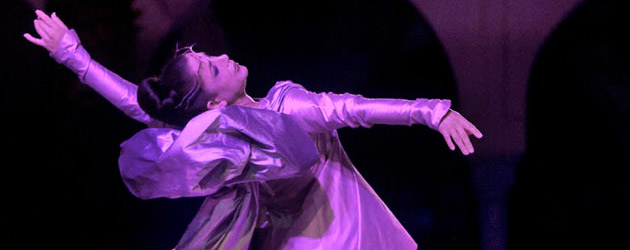Text: Ernesto Novales
Photos: Fernando Ruso
Las Santas de Eva
Company of Eva Yerbabuena. Dance, original idea, choreography and director: Eva Yerbabuena. Dance: Úrsula López, Tamara López, Leonor Leal, Gemma Morado, Vanesa Aibar, Verónica Llavero, Mercedes de Córdoba, Lorena Franco, María Moreno, Myr Garrido, Eduardo Guerrero, Moisés Navarro. Musicians: Paco Jarana, José Valencia, Antonio Coronel, Rocío de Frutos, Fernanda Teixeira, Guillermo Peñalver, Juan Carlos Rivera, Alejandro Casado. Texts: Horacio García. Place: Convento de Santa Clara. Date: April 25th to 28th. Attendance: Full
“Santas de Zurbarán: Persuasión y Devoción” is the important cultural undertaking of the season on behalf of the Seville municipal government, an especially outstanding initiative in the present context of cutbacks and belt-tightening being experienced by the city’s cultural sector. The work is an exposition of the paintings of the virgin saints created by the artist from Fuente de Cantos. These women’s outfits designed by Zurbarán are the inspiration for a series of Spanish dress designers who have created a series of original models to complement the exhibit.
In the magical setting of the Santa Clara cloister – an ancient convent which today is the city’s new cultural venue inaugurated during the last Bienal de Flamenco – the stage design already reveals a hint that what the spectator is about to see is as much a fashion show as a stage show: a huge catwalk in the form of a Greek cross cuts through the entire patio, and the saints interpreted by ten dancers parade across.
The music, mostly composed by Henry Purcell, is interpreted with accustomed command by soloists of the Seville Baroque Orchestra – soprano, harpsichord, flutes and theorbo. Their history-oriented interpretation contrasts with the contemporary take of the designers who recreated the costumes of Zurbarán, some quite original.
With these high-quality elements, Eva Yerbabuena delves into the passion of the saints. Saints that go from persuasion to devotion, passing along the way through other states of mind such as penitence, desire, loneliness, rebellion and self-denial. It is the representation of these women through the eyes of Eva herself.
To bring these visions to life, Eva lays out choreographies full of subtlety and suggestion. The expressive force of flamenco, with only limited exceptions, is excluded from the entire project. The artists soften and dull their movements to become fluid. An approach based on contemporary dance and which has been explored in the artist’s earlier work.
Eva closes out the show interpreting Santa Casilda with a spectacular dress by Elio Berhanyer. After a first part which is extremely evocative and understated, the dancer taps into her dramatic force when she moves from baroque to flamenco in the powerful saeta José Valencia sings to allow her to release the inner beast.
